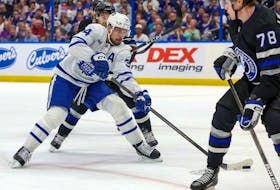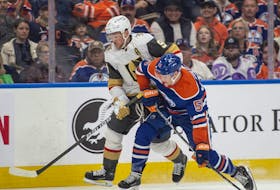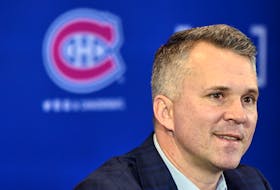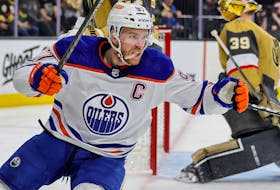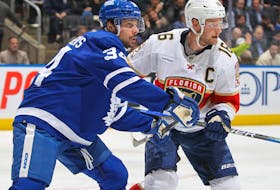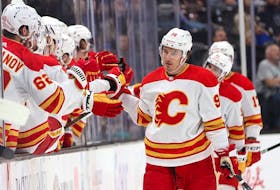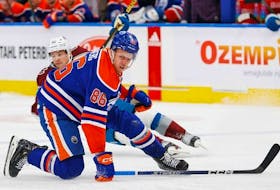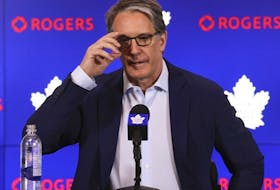Talking politics isn’t something that many athletes want to engage in, so it felt notable Tuesday when Quinn Hughes didn’t shy away from a question about the state of affairs in his country, the U.S.
The Vancouver Canucks’ super-rookie has been back in Canada for two days and is living, like most of his mates from out of town, at the J.W. Marriott Parq Vancouver, after the self-isolation pandemic guidelines spelled out for players arriving from abroad.
(Hughes and a handful of teammates were still allowed to skate at Rogers Arena on Tuesday, while respecting social-distancing rules.)
He’s kept to himself since the NHL season went on pause March 12. Hughes has been living much of the last 3 1/2 months with his family in suburban Canton, Mich., between Ann Arbor, home of the University of Michigan, and Detroit.
Being at home meant the news was front-and-centre many days.
CNN was on TV a lot of the time, he told a collection of reporters on a team-organized Zoom video call. He saw plenty of reports about the Black Lives Matter protests, as well as the COVID-19 pandemic. To stay healthy and to avoid infection, the family stayed home much of the time.
“It was disgraceful what the (police) officers did in Minnesota,” he said of the death of George Floyd. “I think it was important that people did that (protested) and expressed their feelings.”
Keeping fit and mentally strong
Living with his younger brothers Jack and Luke meant that Hughes was able to do plenty of rollerblading, he said, as well as other sports. There’s the standard family basketball hoop, a ping-pong table and a pool.
“We’d play basketball for two or three hours a day and then we’d work out,” he said. “We did a lot of swimming. It was pretty rowdy at the house and we had a lot of fun.”
As June rolled round, he and his brothers were also able to get some skating time in at a local rink.
Now that he’s back in Vancouver, he’s going to have to find a new routine. Hughes isn’t living in his Yaletown condo; he’s staying in swanky hotel digs and will be following the mandated physical-distancing protocols, while being regularly tested for COVID-19.
The time off, he said, gave him plenty of opportunity to reflect on what he’d learned through the first full season of his NHL career. More than anything, he knew he needed to get stronger.
“I feel really strong now. I think I can perform better in the playoffs now than I would have 3 1/2 months ago,” he said of the time he’s put in in his family’s home gym, coupled with the simple reality of being able to rest properly.
He admitted that being mostly holed up in the hotel for days and soon to be weeks on end will be a challenge, but there’s not much he can do about it.
“I think maybe by Day 20, it might feel like a really long road trip, but at the end of the day it is what it is,” he said. “I just want to play hockey and finish out the season. This is what it’s going to look like and things aren’t going to be perfect … Just got to wrap my head around that.”
Dealing with deadlines
In a normal year, Canada Day is the day the NHL’s free-agency market officially opens. But with play still on pause and the 2019-20 season not finishing until sometime this fall, this year it’s just like any other summer day for hockey.
As in, not much happening. Not much in public, anyway.
Contracts normally expire June 30. The Canucks have a bunch of players who normally would be out of contract this week. There are normally bonuses to be paid on July 1, like to Loui Eriksson and Alex Edler. No-trade or no-move clauses kick in, or become modified, or disappear.
In all these cases amendments are going to be made. Players won’t be paid any extra, since they’ve already received their final paycheques for the season, though those remain uncashed, given escrow is going to claw back plenty from player salaries.
The Canucks don’t have cash-flow problems, but there are teams that surely will as the reality of empty arenas continues.
Fiscal Armageddon?
On that note, TSN’s Frank Seravalli has put numbers down on paper about just how tough the next few years are going to be for the NHL even if life returns close to the old normal in a year or so.
The salary cap is tied to hockey revenues, with escrow being used to claw back a percentage of every player’s salary in order to keep the league’s owners holding 50 per cent of overall revenues.
But in a world with massively diminished revenues, all of a suddenly the formulas look broken. Without modifications, the players could have found themselves essentially paying back the totality of their salaries.
According to various reports, the players’ association and the league have a tentative deal that will cap escrow at 20 per cent next season and defer a further 10 per cent of next year’s salaries to be paid at a later date. The cap will be set at $81.5 million for the next two seasons and the current collective bargaining agreement will also be extended by three seasons, through 2024-25.
The players are expected to vote on this deal and a return-to-play plan for this season by the weekend.
CLICK HERE to report a typo.
Is there more to this story? We’d like to hear from you about this or any other stories you think we should know about. Email [email protected] .
Copyright Postmedia Network Inc., 2020

